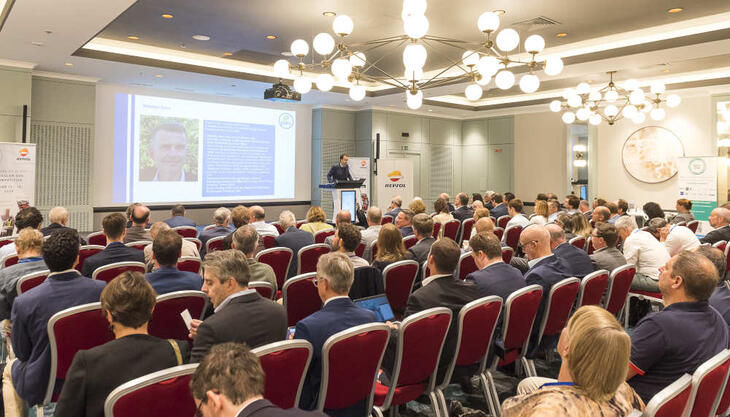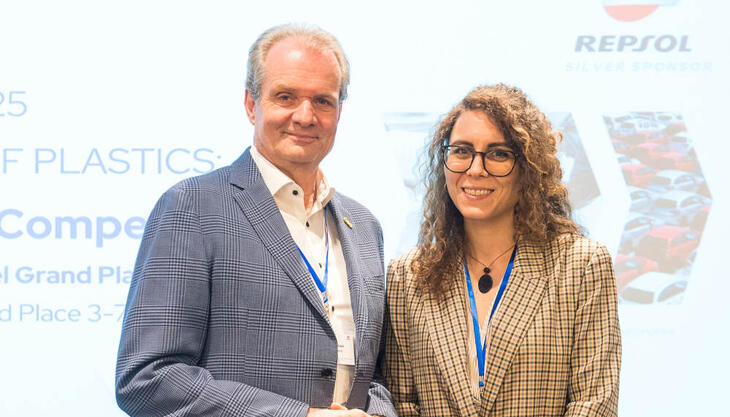Tangible and non-tangible innovations in PET industry and processes
Under a wonderful Tuscanian blue sky attendees from all over the world gathered for the fourteenth editon of the PET Day in Artimino, few kilometers from Florence, Italy. The event, now a firm point on the agenda of all top decision-makers in the PET and polyester industry, was organized by GSI, Italy, the company founded by Francesco Zanchi 23 years ago, and one of the leader in this field. While the environment is still the same over the years, it never ceases to stun all participants: the Medici’s villa, the vineyards, the hills and the small nearby village offers a perfect frame for discussing the latest developments in the market of raw materials and for intense and fruitful networking with professionals involved in the polyester business.
The day started with the warm welcoming remarks offered by Zanchi to the more than 120 people arrived in this 16th Century villa from 5 continents. A brief filmed introduction was shown, explaning how GSI keeps on expanding its worldwide presence to follow-up closely the ever-changing markets. Actually the focus of this year event was on “Innovations”, both tangible and not, in various aspects of the PET industry and processes.
The first speaker, Sanjay Sinha of Reliance, gave a wide picture on the global raw materials situation in the current world economic scenario. While some new uncertainties are adding up (mainly on China growth and Brexit developments), it appears that the polyester chain will reach a more balanced situation thanks to more new capacities in PX and accelerating PTA output rationalization. Freight costs may also impact on trade in 2017.
David
Swift, director of research at PCI Wood Mackenzie, offered a more specific
analysis on PET markets. PET consumption is growing all over the world, and its
use is expanding into areas that were untouched years ago (like aerosol
containers), but the global overcapacity, of about 30%, is expected to remain
steady also for the next few years. As the European industry is suffering, part
of its output will be transferred elsewhere. Anti-dumping duties will affect
somehow international trades too. Last but not least Swift underlined how
important is to PET, also in this period of cheap raw materials, to keep on maintaining
the image of recyclability: the use of bottle flakes must not be too much
reduced to the advantage of virgin resins in order not to damage the efforts
done in the past on this side.
Coming on was Rakesh Gaur, president of Reliance Malaysia Operations, who offered a lecture of a wider picture of polyester business, indicating how this product is unique in its properties and capabilities of satisfy a huge number of different end-uses. Gaur’s opinion is that in the next 5 years there will be more rationalization in this industry and that will bring much better margins for all integrated groups in the field. Finally the ongoing innovations in all the raw materials from PTA up to the fibres, and the higher sustainability, will keep polyesters expanding their uses allowing a better management of the world overcapacity.
Benoit Servais of Van Bael & Bellis gave the latest information on the current anti-dumping
investigations in the EU and Usa. Apart from the one on Korean PTA, initiated this year and whose results we will see in 2017, there could be soon another investigation on PET resins too, still originated from South Korea.
Then Zanchi took the podium to explain how the industry could deal with the usual volatility of the PET market, and how this battle could be won. Thanks to the insights of a globalized company as GSI, which is managing every day instruments for a deeper knowledge of the international markets of raw materials, it is possible to understand the underlying trends and have therefore all the tools to add value to any company operations. Whether it’s purchasing, transport, financing or risk management, today there is a chance for all GSI partners to get advantage of the exceptional tools that this company has developed in over 23 years of history and good reputation. However, while bringing companies to a greater success it is always important not to forget the people, in other areas of the world, who are less fortunate and in need of all basic needs for just surviving day after day. That is why Zanchi, years ago, took the decision to create the Saint Lawrence Foundation, which is currently working to create actual entrepreneurship in Sierra Leone, one of the world poorest countries, following the words of Nobel prize Muhammad Yunus, who participated at the PET Day too in 2009: “All humans are born entrepreneurs”.
The Foundation, whose work was then in detail exposed by Chiara Zanchi, its president, after having supported the creation of a faculty of Agriculture in the University of Makeni, Sierra Leone, aims at helping the locals not only to develop higher knowledge and know-how to solve their food and social problems, but also to create entrepreneurs and enterprises inside a country where there is need of nearly everything, making it less dependant on others.
Paolo Garro, IRI business insight director, started the afternoon session. He gave interesting data on beverage market developments in Italy. Though expectations are for a stagnant market in this field, the portion of PET keeps on increasing (+3% from 2012 to 2016).
Moraldo Masi, business and sales manager at Sacmi, Italy, offered his company approach to new bottle-preform-cap joint developments. New machines and systems to produce better and easier-to-manage components are developed by this Italian-based manufacturer to go hand in hand with significant increases in efficiency and productivity.
Gary Fielding, global marketing director of Polyone, introduced some new products. Masterbatch additives for making bottles more attractive, with metallic effects, or light blocking for dairy, will be bringing a broader range of applications for PET bottles.
Luca
Stramare, director of Corepla, Italian consortium for plastic materials
collection and recycling, explained the current activity done in Italy. Soon
Italy will reach the million tonnes of recollected plastic wastes, and that is
a great target to be achieved. In any case being PET the most recycled packaging
material in Italy and in Europe, in 2007 EPBP (European PET Bottle Platform)
was created to protect PET recyclability and, at the same time, the industry
right to innovate new packaging solutions.
To bring the day towards a conclusion, the usually lively round table of international managers and entrepreneurs aimed at discussing on “Oil at 40dollar/barrel: impact in 2016 and for the coming years”. Most agreed first on the fact that oil was likely to remain below the 60 dollars mark for many years, and this has been considered a big plus for the polyester industry. Such stability will only be positive for allowing PET to expand its presence and take place of other plastic materials. In this environment Zanchi wanted to push all companies to take advantage of this scenario in order to unite and to aim at changing consumer perception of PET, to definitely differentiate it as an eco-friendly material. This could really move PET and polyesters to a higher level, full of new opportunities. To create a “World PET Board” to convey the right message to the people is not an impossible task: it can be done.
















